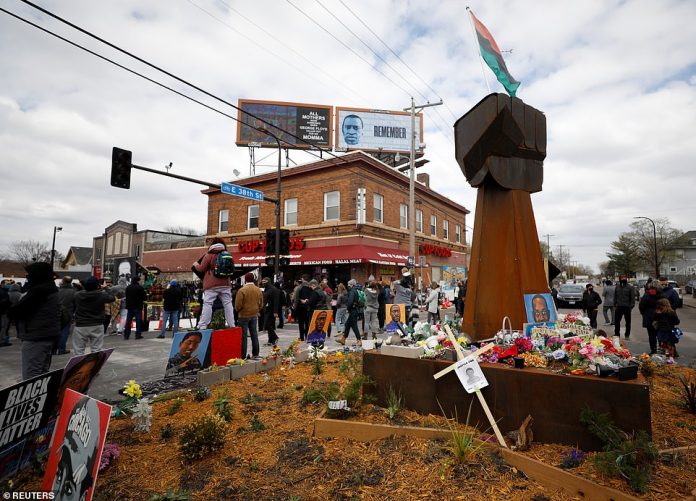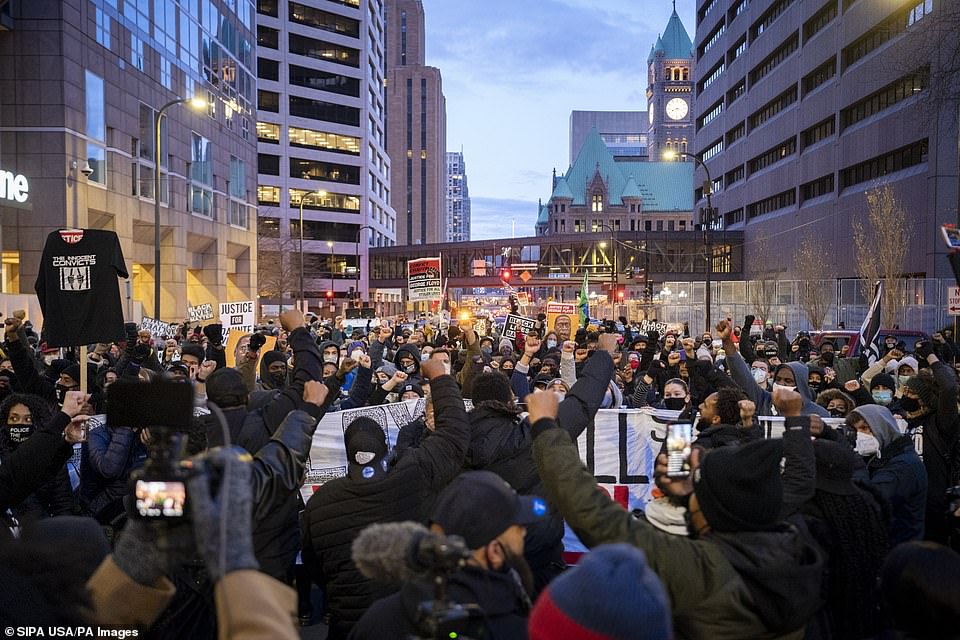Derek Chauvin has been found guilty of second-degree unintentional murder, third-degree murder and second-degree manslaughter in the death of George Floyd.
The jury returned its verdict on Tuesday afternoon after just 10 and a half hours of deliberation.
As the verdict was read out Chauvin looked on silently in the Hennepin County courtroom where jurors spent three weeks listening to testimony about the day Floyd died under the weight of the 45-year-old cop’s knee during an arrest on May 25, 2020.
Floyd’s younger brother, Philonise, 39, who took a knee at the courthouse steps at the start of the trial, was in court to hear the verdict read.
Cheers rose from the crowds that had gathered outside the courthouse and down at the intersection of 38th and Chicago now known as George Floyd Square. Cup Foods, the store in which Floyd was last seen alive, shuttered its doors ahead of the decision.
They had not sent back any questions to the judge or asked to review any of the hours of video or hundreds of exhibits entered in the course of the trial.
The verdict came just hours after President Joe Biden called the evidence against Chauvin ‘overwhelming’ and revealed he called Floyd’s family to share his support after the jury retired on Monday evening.
READ ALSO: Woman stabs 14-year-old student to death while fighting with grandmother
The jury sent their notice that a verdict had been reached at 2.30pm local time as Minneapolis and the country braced for potential violence stemming from the decision.
Non-essential courthouse staff were told to go home as Minneapolis battened down ahead of the verdict with 3,000 National Guard members and 1,100 law enforcement officers keeping a watchful eye over the city that’s been on edge for weeks awaiting the conclusion of the trial.
Over 15 days of testimony the jury of seven men and five women – six white, four black and two bi-racial – was guided through every facet over Floyd’s death through the eyes of 45 witnesses and hundreds of pieces of evidence.
In his opening statement, trial attorney Jerry Blackwell told the jury that Chauvin had betrayed the badge he wore on his heart. He said the former officer had violated police policy and trampled the sanctity of human life.
For Blackwell it all boiled down to the nine minutes 29 seconds of Floyd’s subdual restraint and neck compression. ‘You can believe your eyes’ he said, ‘That it’s a homicide, that it’s a murder.’
Not so, according to defense attorney Eric Nelson, for whom the truth could only be viewed through a far wider lens.
For Nelson this was all about reason, doubt and common sense. Common sense would tell the jury that what they had seen with their own eyes was only one part of a much bigger picture.
He said, ‘We have to examine the totality of the evidence. That’s what this case is ultimately about, the evidence. It is nothing more than that.’
As Nelson sought to un-pick emotions from the scenes of Floyd’s death and the testimony of a host of eyewitnesses brought by the state, a heavy fear of what might happen when the verdict came down gripped the city of Minneapolis.
The downtown area was shored up with boards nailed over the windows of businesses downtown and the concrete blockades, steel fences and bails of barbed wire embracing the court and government buildings.
More than 3,000 members of the National Guard were called in to bolster the 1,100 public safety officers already in place – their armored vehicles parked in serried rank not only at the government buildings but in store parking lots, intersections and sidewalks across the city.
The city was reported to have spent more than $1million on security in a four-stage plan dubbed Operation Safety Net, which kicked off with jury selection and entered its final stage with the verdict announcement.
The screw turned tighter with the April 11 shooting of Daunte Wright – the 20-year-old black man killed in a traffic stop by Brooklyn Center police barely ten miles from where Chauvin stood trial.
Night after night the protests raged and curfews were broken in an unending echo of the civil unrest that followed Floyd’s death last May.
The verdict brings to an end a trial that has been riven with drama and threats of derailment that started before the jury was even empaneled – with the city’s announcement of their $27million civil settlement with the Floyd family – and continued after closing statements’ end.
Nelson made the last of his many bids for a mistrial on the back of statements from Rep Maxine Waters, who on the eve of closing statements called for protesters to ‘get more confrontational’ if the jury did not return a verdict of ‘guilty, guilty, guilty’.
udge Cahill called Waters’ comments ‘abhorrent’ but denied Nelson’s mistrial bid and his contention that the jury could no longer be considered ‘untainted’.
Nelson had tried on many occasions to have the trial delayed and moved out of Hennepin County, but Judge Cahill would hear of neither. There was not a county in the state, he said, that had not heard of Chauvin and Floyd and no span of time would be great enough for the case to have been forgotten by any.
The judge also refused Nelson’s repeated bids to have the jury sequestered ahead of deliberations. The defense attorney’s most recent bid came on the heels of the police shooting of Wright.
Mail Online























